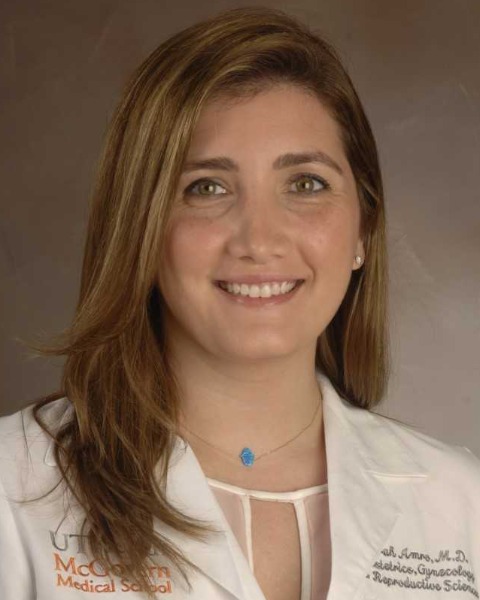Ultrasound/Imaging
Poster Session 3
(838) Transvaginal/Transvesical Ultrasound (TVUS) to Diagnose Placenta Accreta Spectrum (PAS),its Severity & to Predict Blood Loss

Neha Agarwal, MBBS, MD
Post doctoral Research Fellow
McGovern Medical School at UTHealth Houston
Houston, TX, United States.jpg)
Michal Fishel Bartal, MD (she/her/hers)
Maternal Fetal Medicine Faculty
McGovern Medical School at UTHealth Houston, Sheba Medical Center, Tel Hashomer, Sackler School of Medicine, Tel Aviv University, Tel Aviv, Israel
Houston, TX, United States
Jennie Coselli, MD
MFM Fellow
Department of Obstetrics, Gynecology and Reproductive Sciences McGovern Medical School at The University of Texas Health Science Center at Houston (UTHealth)
Houston, TX, United States- ES
Eleazar E. Soto Torres, MD
McGovern Medical School at UTHealth Houston
Houston, TX, United States 
Edgar Hernandez Andrade, MD, PhD (he/him/his)
Professor
McGovern Medical School at UTHealth Houston
Houston, TX, United States- DL
Dejian Lai, PhD
Professor
McGovern Medical School at UTHealth Houston
Houston, TX, United States - AS
Ashley Salazar, DNP
McGovern Medical School at UTHealth Houston
Houston, TX, United States 
Sami Backley, MD
Clinical Fellow PGY 8
McGovern Medical School at The University of Texas Health Science Center at Houston (UTHealth)
Houston, TX, United States
Farah H. Amro, MD
Assistant Professor
McGovern Medical School at The University of Texas Health Science Center at Houston (UTHealth)
Houston, TX, United States.jpg)
Anthony Johnson, DO
Professor
McGovern Medical School at UTHealth Houston
Houston, TX, United States
Jimmy Espinoza, MD, MSc (he/him/his)
Professor
McGovern Medical School at the University of Texas Health Science Center Houston, The Fetal Center- Children’s Memorial Hermann Hospital
Houston, TX, United States
Eric P. Bergh, MD
Assistant Professor
McGovern Medical School at The University of Texas Health Science Center at Houston (UTHealth)
Houston, TX, United States- RG
Rosa Guerra, MD
McGovern Medical School at UTHealth Houston
Houston, TX, United States - VM
Vahed Maroufy, PhD
Assistant Professor
McGovern Medical School at UTHealth Houston
Houston, TX, United States 
Baha M. Sibai, MD
Professor
Hermann Memorial Hospital
Houston, TX, United States- SB
Sean C. Blackwell, MD
Professor
Children's Memorial Hermann Hospital
Houston, TX, United States 
Ramesha Papanna, MD, MPH
Professor
McGovern Medical School at UTHealth Houston
Houston, TX, United States
Primary & Presenting Author(s)
Coauthor(s)
Diagnosing PAS disorders and their severity using imaging technology remains a challenge. TVUS (full bladder) offers a unique opportunity to evaluate the anatomy, including cervical region involvement and vascular flow. Our study developed and evaluated semi-quantitative score, based on TVUS, to accurately diagnose PAS and predict blood loss during surgery in pregnant women with clinical and ultrasound evidence of PAS.
Study Design:
A prospective cohort study was performed from 2018 -2023 of patients referred to a quaternary center with suspected PAS on 2D ultrasound and clinical suspicion. A pre-determined scoring system was applied based on uterine wall, arterial vascularity, and cervical involvement. Each of three categories was scored 0-3, yielding a cumulative score of 0-9. Patients with score of 0 were recommended c-section with placenta removal. Scores from 1-9 were managed on multi-disciplinary discussion and patient preference among the following options: c-section with placenta removal, c-section with placenta in-situ (conservative) with or without interval hysterectomy, or c-hysterectomy. Multivariate linear regression analysis was performed to predict blood loss using evaluated risk factors and PAS scoring.
Results:
73 patients were evaluated and categorized by score (Table1). These categories differed significantly in terms of management type, estimated blood loss, ICU admission and hospital length of stay. All patients in Category 0 (score 0) were successfully managed as c-section with placenta removal. On multivariate analysis, Category 3 (score 7-9) and c-hysterectomy were associated with significantly higher blood loss; prior history of c-section deliveries was not associated with estimated blood loss (EBL). Excluding the conservative management group, EBL was directly correlated with the scoring category.
Conclusion:
Our TVUS-based scoring accurately diagnosed PAS. Cases with a score of 0 had a successful c-section with placenta removal. The complexity of management, blood loss and morbidity increased with higher scores.

